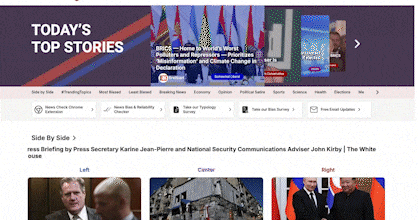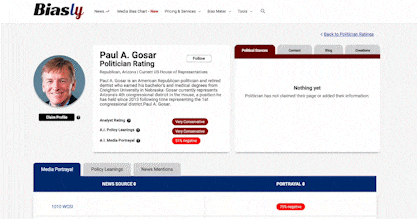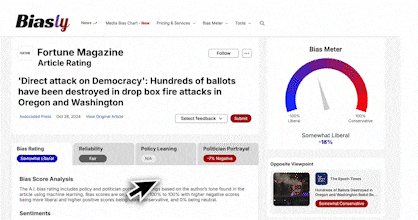
Yahoo News provides a platform for diverse news sources and contributors. The reliability of the outlet can vary depending on the specific sources and articles featured. Yahoo News does not generate original content but aggregates news from various outlets.
Although it often includes reputable facts and figures in its content, readers should still critically engage with Yahoo News by meticulously verifying the credibility of underlying sources. Discerning and cross-referencing information to ensure accuracy and reliability is a healthy exercise for staying well-informed.
Does Reliability Matter?
Reliability, in general, refers to how trustworthy or accurate information, or in this case, a news source is. If we consider this definition, it quickly becomes clear why reliability is important in media sources. If we can’t trust the things we read then there isn’t much of a point in continuing to consume content from that source, after all. So how exactly can we gauge the reliability of a news source anyways?
There are several potential measures of reliability to look out for when trying to determine whether a media source is reliable or not. Red flags for an unreliable article can include the presence of wild unsubstantiated claims, facts dependent on other unreliable sources, heavy use of opinionated language, and more. Some indicators of a reliable news source, on the other hand, include things like:
- Absence of subjective/opinionated language in articles
- Credible sources cited (e.g., neutral sources, .gov, .edu websites)
- Facts and statistics backed by multiple relevant outside sources
- Use of primary sources when possible (e.g., interviews, quotes)
- Information that remains consistent across news sources
So How Does Yahoo News Fare in its Reliability?
The political reliability index developed by Biasly objectively assesses news organizations’ accuracy and trustworthiness. Yahoo News’s overall Reliability Score has been rated as ‘Fair’ by Biasly. This rating is a weighted average of two distinct scores: the Fact Analysis Score and the Source Analysis Score, each evaluating separate components of Yahoo News’s Reliability. When computing the Average Reliability of the article the Fact Analysis score is more heavily weighted. These ratings are as follows in the next two paragraphs:
Yahoo News’s Fact Analysis Score is ‘Fair,’ which suggests readers can trust some of Yahoo News’s content online. The Fact Analysis score focuses more on the accuracy of claims, facts, and sources presented in the article and any hints of selection and omission bias, which we will discuss further in the article.
Yahoo News’s Source Analysis Score is ‘Fair,’ which suggests readers can trust some of the sources, links, and quotes provided by the news source. This score, which is based on A.I., focuses on assessing the quality of sources and quotes used including their number, lengths, uniqueness, and diversity.
However, since these scores are based on percentages and averages, individual articles could be more or less trustworthy depending on the context, author, and other factors. Our findings show that Yahoo News’s reliability is mostly but not all factual because they have retracted several stories in the past or had pieces that were not factual.
Let us analyze the supporting data for Yahoo News’s rankings and discuss what to watch out for while searching for trustworthy news sources.
Yahoo News Accuracy and Reliability
The credibility of news organizations is impacted significantly by bias and political orientation. Like numerous other media organizations, Yahoo News has occasionally received accusations of prioritizing the liberal agenda above facts. We can evaluate the integrity of Yahoo News’ stories, deduce how well the publication supports assertions with evidence, and see whether this is true. We will check for selection and omission bias as we assess the articles’ correctness and factuality.
Selection bias is when stories and facts are selected or deselected, often on ideological grounds, to create a narrative in support of the new sources’ ideology. Omission bias, on the other hand, is when different opinions and political views regarding a situation are left out so that the reader is only exposed to the ideological perspective supported by the author. It’s important to keep in mind these two types of biases when trying to assess an article’s level of accuracy.
Biasly assigns a percentage score to accuracy, with one being the least accurate and 100 being the most. We arrive at our ratings by weighing assertions with supporting evidence, the number of reliable internal sources, and the number of reliable external sources employed. A full page at Biasly’s website includes dependability and accuracy ratings for newly released Yahoo News stories. As previously stated, according to the reports analytics have assessed, Yahoo News generally has a Fair reliability rating. This score can vary from article to article, though, and the most extreme variations in dependability are from bias, notably omission/selection bias.
For instance, this Yahoo News article, “Senate passes bill to avert government shutdown — Lee, Crapo, Risch vote ‘no’,” is rated by Biasly as Extremely Liberal, with only Fair reliability. The article exhibits potential omission bias by disproportionately highlighting Republican objections against short-term spending bills to avert a government shutdown, particularly those of Senators Mike Lee, Mike Crapo, and James Risch. The focus on their concerns, as expressed by Senator Mike Lee, may leave out the perspectives of House Democrats supporting the bill and create a narrative that emphasizes dissent within the Republican ranks without offering a broader view.
“To preserve our nation’s fiscal health, I voted against the Continuing Resolution,” said Senator Mike Lee, expressing fiscal concerns. However, the article may downplay arguments in favor of the bill, such as the need for temporary funding to avoid a government shutdown and the broader context of political negotiations. Additionally, it mentions House Speaker Mike Johnson’s challenges but lacks a comprehensive exploration of his specific reasons or perspective, contributing to an incomplete understanding of the events leading to the Senate bill.”
A more balanced approach would involve presenting a comprehensive view of the reasons and arguments on both sides of the issue. As a result, the article leaves readers with a skewed understanding of the broader context and motivations behind the Senate’s decision. We will look at more examples like this below, further investigating the reliability of Yahoo News.
Analysis of Reliability in Yahoo News Opinion Pieces
Opinion-style journalism is a suitable venue for reporters to express their personal beliefs. Although op-eds are less trustworthy because of their subjectivity, they can still be valuable in increasing one’s understanding of various topics.
Most of Yahoo News’ opinion pieces unquestionably have a liberal slant. This bias is evident in the framing of issues, choice of sources, and overall tone. For example, Biasly designated this article, “Trump and Churchill: A new book looks at both, and chooses Trump,” as Moderately Liberal. At the same time, it still maintains a Good reliability rating for its excellent use of multiple quotes and unique sources. This article is a prime example of writing that, while inherently biased, is still convincing because the author provides substantial evidence to support their claims. Regardless, it would be helpful for Yahoo News to incorporate a more healthy blend of opposing viewpoints in their content.
Quality of Sources and Facts Used
Yahoo News consistently excels at using reliable sources and citing facts as evidence. This opinion piece, “Coronavirus distancing: Don’t forget about veterans. For them, loneliness can be deadly,” is no exception. Despite Lois Pope, the author, only using two direct quotes, the article is brief. Pope skillfully conveys her message while maintaining a high level of impact. The two quotes in question are also short in length.
In addition to that, the author’s nine sources for the article were as follows:
- congress.gov: The progress it took for Congress to pass the PAWS for Veterans Therapy Act
- military.com: Information on how the bill got unanimously passed to provide service dogs for veterans with PTSD
- Service Dog Certifications: Information on service dogs and how much it costs to train them
- The ASPCA: Statistics on pets and animal shelters in the United States
- Purdue University: Information on how service dogs help veterans with PTSD
- Stars and Stripes: Insight about why veterans are committing suicide at an alarming rate
- Brown University: The amount of U.S. service members who were killed (7,057) or committed suicide (30,177) in post-9/11 operations as of July 2021
- The U.S. Department of Veterans Affairs: The loneliness of veterans and how it fuels their depression
- The 2019 National Veteran Suicide Prevention Annual Report: The suicide rate among veterans was 1.5 times the national average.
The sources employed exhibit both exceptional quality and quantity. Most of them, such as Military.com and Stars and Stripes, demonstrate a bipartisan perspective in their coverage. Additionally, bipartisan entities, like Congress.gov and the U.S. Department of Affairs, contribute to the reliability of the information, given their status as government websites. Of course, there is always the possibility that whoever is in power (political party or politician) has more control over what these sources say. This drawback means that readers can never be too careful of what they see online, no matter how authoritative or definitive the source might be.
On the other hand, sources such as Service Dog Certifications and the ASPCA remain apolitical, adding more credibility to the mix. Lastly, educational institutions like Purdue and Brown University are often regarded as esteemed sources, offering valuable and dependable information. Beyond the surface of these stellar reputations, Purdue University shows a more balanced political leaning, with a student poll indicating a mix of conservative, moderate, and liberal views among its students. In contrast, Brown University leans more towards the left, evidenced by a study revealing that 94.5% of speakers invited to the campus lean left ideologically and that most professors speaking at the university skew liberal.
The article emphasizes the gravity of veteran loneliness and its association with mental health challenges, stating:
“A recent study by the Department of Veterans Affairs highlights the problem, finding that loneliness among former service members is a considerable issue because it is directly tied to the highest levels of depression and suicidal thoughts.”
This quote, sourced from the Department of Veterans Affairs, underscores the urgency of addressing the profound impact of loneliness on veterans’ well-being.
Similarly, the article from above, “Trump and Churchill: A new book looks at both, and chooses Trump,” effectively uses multiple quotes and reliable sources to examine a book comparing Donald Trump to Winston Churchill. However, it could enhance its credibility by incorporating more opposing viewpoints. The author notes the book’s attempt to draw parallels between the two leaders but highlights potential weaknesses in the argument that Trump is better than Churchill, particularly regarding the former’s handling of the pandemic and his eagerness to court approval from America’s enemies. A direct quote from the article, which mostly aligns with the author’s opinion, emphasizes Newt Gingrich’s challenge in taking the book seriously, even though he thinks it still “holds up.”
“Even Newt Gingrich, who was enlisted to write the foreword, seems to have had trouble treating the premise with a straight face, writing that ‘if Churchill is obvious as a champion of Western civilization, the case for President Donald Trump is a little more challenging,’ before conceding that ‘in the end I think it holds up.”‘
The article critiques the book’s comparison of Trump to Churchill, suggesting that this analogy lacks the historical depth associated with Churchill. It points out that Trump’s actions may not resonate with the seriousness typically linked to Churchill’s legacy. The criticism extends to the portrayal of Trump’s adversaries, viewed as largely imaginary straw men like “deep state operatives” and “triggered college students,” undermining the seriousness of the comparison.
So, Is Yahoo News Reliable?
Regarding reliability, Yahoo News is a trustworthy news source with a reasonably solid reputation for journalistic integrity. Still, punctuated by occasional exceptions, the integrity of its publications may vary, and readers should conduct thorough research into media reliability and accuracy. By scrutinizing sources, evaluating the selection of information, identifying omissions, and verifying factual content, individuals can develop a more nuanced understanding of the reliability of news articles on Yahoo News. For additional assistance in discerning reliability issues and ensuring access to the most accurate and dependable news, one can utilize tools such as Biasly’s News Bias Checker.

























